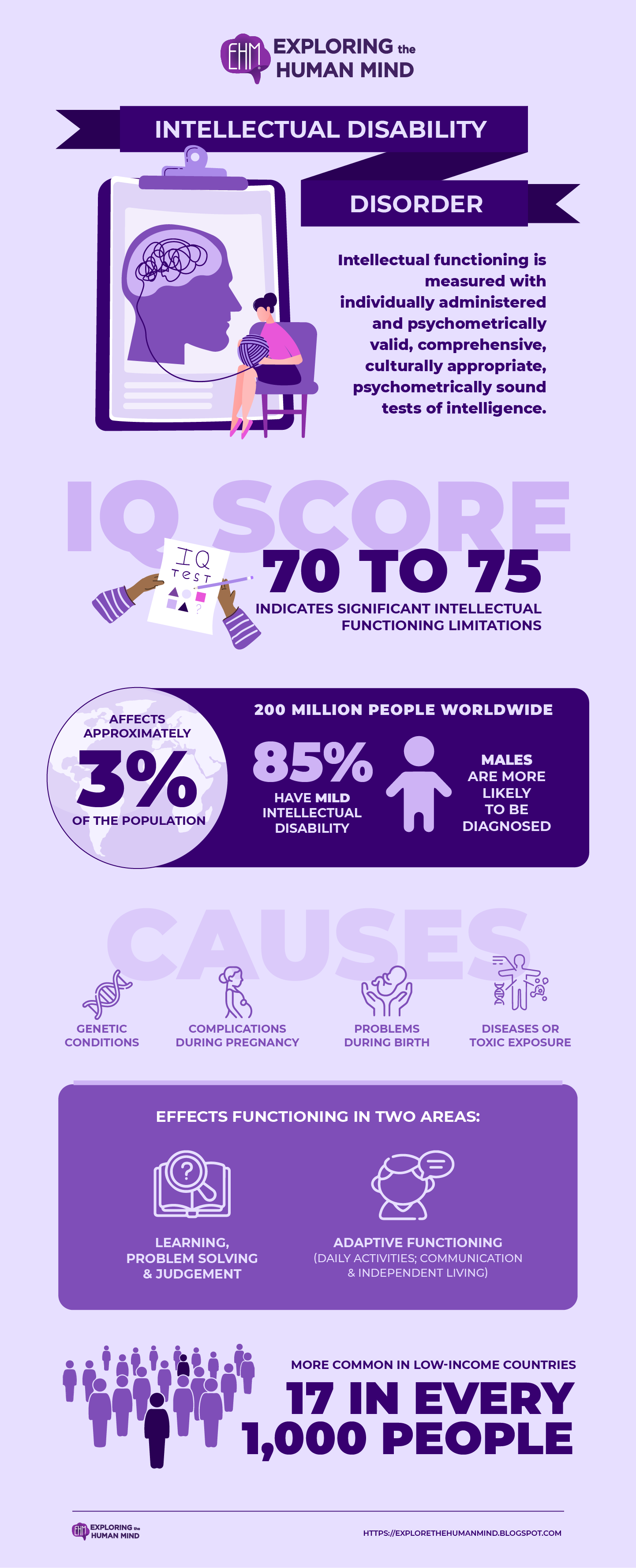Intellectual Disability Introduction
Intellectual functioning is measured with individually administered and psychometrically valid, comprehensive, culturally appropriate, psychometrically sound tests of intelligence.While a specific full-scale IQ test score is no longer required for diagnosis, standardised testing is used in the process. A full-scale IQ score of 70 to 75 indicates significant intellectual functioning limitations.
However, the IQ score must be interpreted in light of the individual's difficulties with general mental abilities. Furthermore, subtest scores can vary significantly, so the full-scale IQ score may not accurately reflect overall intellectual functioning. As a result, clinical judgement is required when interpreting IQ test results.
Problems with general mental abilities cause intellectual disability, which affects functioning in two areas:
- Learning, problem solving, and judgement are all examples of cognitive functioning.
- Adaptive functioning (daily activities such as communication and independent living).
Furthermore, the intellectual and adaptive deficits begin early in development. Intellectual disability affects approximately 1-3% of the population(as many as 200 million people), with approximately 85% having mild intellectual disability. Males are more likely to be diagnosed with intellectual disability than females.
Intellectual disability can be caused by a problem that begins before a child reaches the age of 18 - even before birth. It can be caused by an injury, a disease, or a brain problem. The cause of intellectual disability is unknown for many children.

vectors by Freepick; graphic design by Vadot
Causes
The most common causes of intellectual disabilities are:
- Genetic conditions. Sometimes an intellectual disability is caused by inherited abnormal genes, errors when genes combine, or other factors.
- Complications during pregnancy. When a baby does not develop properly inside the mother, he or she may be born with an intellectual disability. For example, there could be an issue with how the baby's cells divide.
- Problems during birth.If there are complications during labour and delivery, such as a baby not receiving enough oxygen, he or she may be born with an intellectual disability.
- Diseases or toxic exposure. Intellectual disabilities can be caused by diseases such as whooping cough, measles, or meningitis. They can also be caused by severe malnutrition, a lack of appropriate medical care, or exposure to poisons such as lead or mercury.
Intellectual disability is a chronic condition that lasts a lifetime. Early and ongoing intervention, on the other hand, may improve functioning and allow the person to thrive throughout their lifetime. Medical or genetic conditions, as well as co-occurring conditions, frequently complicate the lives of people with intellectual disabilities.
Once a diagnosis is made, assistance for people with intellectual disabilities focuses on the individual's strengths and needs, as well as the supports he or she requires to function at home, at school/work, and in the community.
Statistics
Intellectual disability is significantly more common in low-income countries—16.41 in every 1,000 people. Disabilities overall are more common in low-income countries.
The United Nations Development Program estimates that 80 percent of all people with disabilities live in low-income countries. While people with disabilities represent approximately one in 10 people worldwide, they are one in every five of the world’s poorest people.
Reference:
What is Intellectual Disability? (2023). Psychiatry.org. https://www.psychiatry.org/patients-families/intellectual-disability/what-is-intellectual-disability CDC. (2019, October 25). Facts About Intellectual Disability. Centers for Disease Control and Prevention. https://www.cdc.gov/ncbddd/developmentaldisabilities/facts-about-intellectual-disability.html
What is Intellectual Disability? (2018, July 25). SpecialOlympics.org; SpecialOlympics.org. https://www.specialolympics.org/about/intellectual-disabilities/what-is-intellectual-disability#:~:text=What%20Is%20an%20Intellectual%20Disability,social%20and%20self%2Dcare%20skills.






Comments
Post a Comment